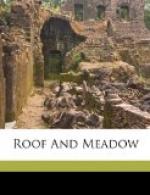There is a special Providence busy with the boy.
This huge nest of the fish-hawks was more than a nest; it was a castle in very truth, in the sheltering crevices of whose uneven walls a small community of purple grackles lived. Wedged in among the protruding sticks was nest above nest, plastering the great pile over, making it almost grassy with their loose flying ends. I remember that I counted more than twenty of these crow-blacks’ nests the time I climbed the tree, and that I destroyed several in breaking my way up the face of the structure.
Do the blackbirds nest here for the protection afforded by the presence of the hawks? Do they come for the crumbs which fall from these great people’s table? Or is it the excellent opportunity for social life offered by this convenient apartment-house that attracts?
The purple grackles are a garrulous, gossipy set, as every one knows. They are able-bodied, not particularly fond of fish, and inclined to seek the neighborhood of man, rather than to come out here away from him. They make very good American rooks. So I am led to think it is their love of “neighboring” that brings them about the hawk’s nest. If this surmise is correct, then the presence of two families of English sparrows among them might account for there being only eight nests now, where a decade ago there were twenty.
I was amused—no longer amazed—at finding the sparrows here. The seed of these birds shall possess the earth. Is there even now a spot into which the bumptious, mannerless, ubiquitous little pleb has not pushed himself? If you look for him in the rain-pipes of the Fifth Avenue mansions, he is there; if you search for him in the middle of the wide, silent salt-marsh, he is there; if you take—but it is vain to take the wings of the morning, or of anything else, in the hope of flying to a spot where the stumpy little wings of the English sparrow have not already carried him.
There is something really admirable in the unqualified sense of ownership, the absolute want of diffidence, the abiding self-possession and coolness of these birds. One cannot measure it in the city streets, where everybody jostles and stares. It can be appreciated only in the marsh: here in the silence, the secrecy, the withdrawing, where even the formidable-looking fiddler-crabs shy and sidle into their holes as you pass; here, where the sparrows may perch upon the rim of a great hawk’s nest, twist their necks, ogle you out of countenance, and demand what business brought you to the marsh.
I hunted round for a stone when one of them buttonholed me. He wasn’t insolent, but he was impertinent. The two hawks and the blackbirds flew off as I came up; but the sparrows stayed. They were the only ones in possession as I moved away; and they will be the only ones in possession when I return. If that is next summer, then I shall find a colony of twenty sparrow families around the hawk’s nest. The purple grackles will be gone. And the fish-hawks? Only the question of another year or so when they, too, shall be dispossessed and gone. But where will they go to escape the sparrows?




